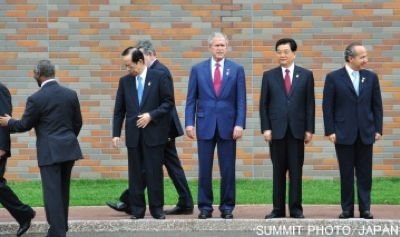
Perhaps no single moment best encapsulated Bush's (dismal) record on the environment than his final meeting at the G8 summit. Fists pumping defiantly into the air -- much to the surprise (and, one can assume, consternation) of his fellow world leaders -- Bush gleefully proclaimed: "Goodbye from the world's biggest polluter." While many have dismissed this comment as a poorly conceived joke, I can't think of a more frank, emblematic statement from a president who still refuses to acknowledge the severity of global climate change.

Granted, Bush has hardly been the chief obstructionist in his administration when it comes to climate change talks and regulation. That dubious honor certainly goes to Mr. "conservation-is-a-personal-virtue" Cheney, whose influence has only seemed to grow during the Bush presidency's final months (of course, one could argue that it has always been at its peak). Yet, whether it be through his early and consistent opposition to the Kyoto Protocol and other emission targets or his renewed embrace of offshore drilling (alongside his good friend, John McSame), the Decider has pulled out all the stops to ensure "science" doesn't get in the way of his shenanigans or those of his friends from the oil industry.
As he did on most of his early (somewhat commendable) 2000 campaign promises, Bush quickly reversed his pledge to regulate carbon dioxide as an air pollutant and ditched all efforts to give even a remote semblance of governing from the middle (remember that "compassionate" conservative talk?) by booting all independent-minded bureaucrats in favor of his ideological, incompetent cronies. Predictably, that resulted in years of censored climate science research, little to no progress on the issues of conservation and alternative energy and, of course, giveaways galore to the already uber-profitable fossil fuel industry.
Despite some signs of optimism from other G8 leaders -- several of which claimed the Hokkaido summit was a clear "breakthrough" -- there is little doubt that any substantive talks over emission cuts will have to wait until the next president takes office. The fact that world leaders and the press consider Bush's "consideration" of (very) modest emission cuts a sign of clear progress is depressing enough; the fact that they might actually believe him is a whole other story.
Back in the U.S., where we've already born witness to some fairly reprehensible actions on the part of his administration, we've only seen a continuation of the Bush "take no prisoners" approach to greenhouse gas regulation. Though by no means a surprise, his administration's stewardship on the environment arguably hit a new low (and that's saying a lot) when it was revealed that the White House Office of Management and Budget simply refused to open an email sent to it by the EPA outlining the health consequences of climate change. Or take the Vice President's (successful) attempts to remove the sections of CDC director Julie Gerberding's Senate testimony alleging a link between climate change and human health.
It was especially fitting that the EPA's final action on climate change was... to take no action. Thumbing their collective noses at a recent Supreme Court decision which directed the federal government to regulate carbon dioxide under the Clean Air Act, the administration, led in this instance by EPA head (and Bush lapdog) Stephen Johnson, said it would seek public comment over the next few months before taking any meaningful action (i.e. pass the buck down to the next guy).
You know things are bad when even loyal surrogates feel the need to speak out in favor of greenhouse gas regulation on the pages of The Washington Post. Or when staunch supporters like California Governor Arnold Schwarzenegger call your environmental policy "bogus." So, please, let's drop any pretenses that Bush may have finally come around to embracing serious climate change legislation. His recognition of the crisis (if he even really does recognize it) comes years too late, and his actions, or non-actions, continue to speak volumes.
Given his abysmal overall record, it's hard to assign the "worst" label to any one of his botched policies. In light of the many grave impacts climate change is expected to have (and already has had) on our planet, I would make the case that Bush's stand on the environment qualifies as his worst failure -- one which, unfortunately, will long outlive his legacy.